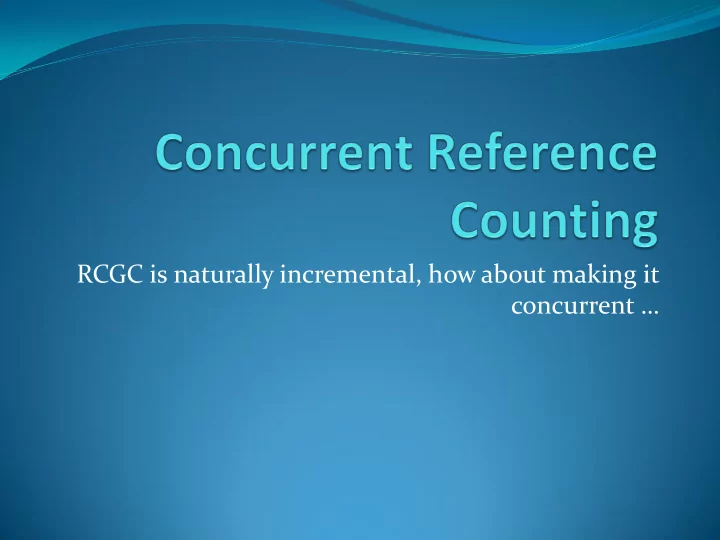

RCGC is naturally incremental, how about making it concurrent …
Review Incremental mark-sweep Steele’s multiprocessing, compactifying collector Dijkstra’s on -the-fly collector Kung and Song improved four-color collector Yuasa sequential collector Uses snapshot-at-the-beginning write-barrier Compared using these metrics Operation of write-barrier Treatment of new objects Cost of initialization & termination of each GC cycle 2
Initialization of GC In sequential algorithm When request for more memory cannot be satisfied In serial incremental MM systems When free memory falls below a certain threshold Yuasa suggests heap space headroom ~ 22% How to initiate GC Simple method: push pointers in registers, system stack, & global variables on marking stack (color them grey) Root set may be large If suspending mutator, pause may be unbounded 3
Bounding initiation pause Kung & Song: Push roots on double-ended mark queue one at a time Incremental: mutator’s computation is unrestricted Yuasa: Copy entire program stack to saved_stack using a fast copy method (e.g. UNIX memcpy ) Entries in saved_stack transferred to mark stack k2 at a time Reduces fragmentation 4
Marking in concurrent system Concurrent system: Multiple processes or threads execute at the same time and potentially interact with each other Collector locks mark stack while examining it 5
Termination of GC Mark phase completes when no grey object left in heap Dijkstra determines this by scanning for grey objects Restarts marking from any grey objects encountered Marking terminates when no grey object found Can marking and sweeping be pipelined? Quiennec says yes Use two color fields Start mark phase of collection cycle n+1 while sweeping in cycle n Odd collections use one color field while even collections uses the other 6
Concurrent reference counting Updating a RC must be atomic to avoid race conditions between threads Can lead to premature collection of objects Atomicity requires locking shared objects Increases cost of pointer assignment Increase mutator performance Run collector in separate thread Make collector responsible for updating RC fields Mutators no longer update RC but log assignments in a block of a transaction queue (figure on next slide) 7
Modula-2+ RC architecture Jones and Lin: Diagram 8.7 8
Modula-2+ RC Mutator and collector communicates through a transaction queue When current block is full (~ 16, 384 assignments) or aout 40 KB of data allocated Mutator notifies collector Mutator gets new empty block Lock required to prevent simultaneous assignment to same shared variable 9
Reducing RC cost Distinguish assignments to local variables from assignments to global variables and heap data Only reference count shared-pointer-valued-variables RC is only lower bound of refs to object from local & shared variables 10
Mutator code: shared references update(A, C){ LOCK mutex insert (A, C, tq) // insert in transaction queue if( tq is full){ notify_collector(tq) // send block to collector tq = gt_next_block() } *A = C } 11
Modula-2+ RC algorithm TQ Block holds details up to some time t 0 Collector interrupts threads one at a time to scan its state Collector locks mutex to stop a thread Any ref in thread’s state to heap object is saved for later use 12
Modula-2+ RC algorithm All thread states scanned at time t 1 Collector adjust RC of pair of variables inserted in tq If RC == o, object added to Zero-Count-List (ZCL) Object deleted if shared RC== 0 at t 0 and local RC == 0 and not on RHS of assignment 13
Collector code: shared references collector(){ while (; ;){ tq = wait_next_block() for each thread th { LOCK mutex{ suspend(th) scan_thread(th) restart(th) } } adjust_counts(tq) free_block(tq) adjust_shared_counts() process_ZCL() } 14
Processing ZCL If object’s shared RC no longer 0, it is removed from ZCL If object is found in a thread state, it is left in ZCL It may be freed in future collection Otherwise object is removed from ZCL and recursively freed Note: Can reduce cost of assignment Use per thread transaction queue 15
Recommend
More recommend